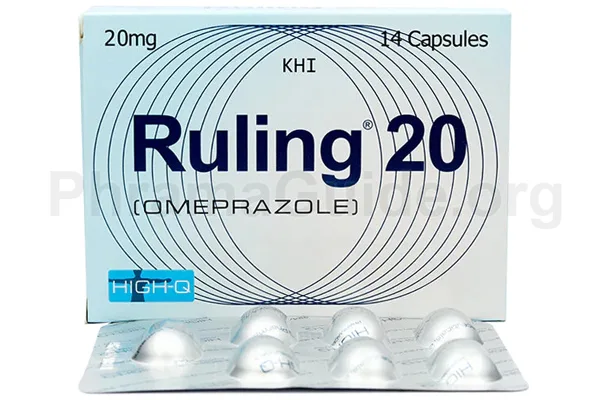Ruling is a proton pump inhibitor (PPI) commonly used to reduce stomach acid production. While it is generally well-tolerated, some people may experience side effects. Here are some common and less common side effects of Ruling.
Common Side Effects
Gastrointestinal Issues:
- Nausea: Some individuals may feel nauseous.
- Vomiting: Occasional vomiting can occur.
- Diarrhea or constipation: Changes in bowel habits may occur.
Central Nervous System Effects:
- Headache: Some people may experience headaches.
Musculoskeletal Issues:
- Back pain: This has been reported in some cases.
Respiratory System:
- Respiratory infections: There is a slight increase in the risk of respiratory infections.
Dermatological Reactions:
- Skin rash: Some individuals may develop a rash.
Metabolic/Nutritional Effects:
- Low magnesium levels: Long-term use may be associated with a risk of low magnesium levels, which can lead to symptoms such as muscle spasms, irregular heartbeat, or seizures.
- Vitamin B12 deficiency: Long-term use may also reduce the absorption of vitamin B12.
Other Possible Effects:
- Dizziness: Some people may experience dizziness.
- Sleep disturbances: Changes in sleep patterns have been reported.
Less Common Side Effects
Hepatic (Liver) Effects:
- Elevated liver enzymes: In rare cases, Ruling may cause an increase in liver enzymes, which can be an indicator of liver function.
Renal (Kidney) Effects:
- Kidney disease: Some studies have suggested a potential association between long-term PPI use and an increased risk of kidney disease, although the evidence is not conclusive.
Hematological (Blood) Effects:
- Reduced white blood cell count: Rarely, Ruling use has been associated with a decrease in white blood cell count.
Endocrine Effects:
- Hypomagnesemia: In rare cases, prolonged use of PPIs like Ruling may lead to low magnesium levels in the blood, which can cause symptoms such as muscle spasms, irregular heartbeat, and seizures.
Neurological Effects:
- Peripheral neuropathy: Some reports suggest a potential link between long-term PPI use and peripheral neuropathy, although more research is needed to establish a clear connection.
Less Common Gastrointestinal Effects:
- Clostridium difficile infection: PPIs, including Ruling, may be associated with an increased risk of developing Clostridium difficile-associated diarrhea, a potentially severe infection of the colon.

What is Ruling?
Ruling is one of the leading brands of Omeprazole, manufactured and marketed by High Q Pharmaceuticals (Pvt) Ltd, Pakistan.
Ruling : Available Formulations and Strengths
Presently, Ruling is available in Capsule and Infusion Forms.
Ruling Capsule : 20mg strength.
Ruling Infusion : 40mg strength.
What Are The Possible Drug Interactions of Ruling?
- Warfarin: Ruling may increase the effects of warfarin, an anticoagulant (blood thinner), potentially leading to an increased risk of bleeding. Monitoring and adjustment of warfarin dosage may be necessary.
- Clopidogrel: There has been concern about a potential interaction between Ruling and clopidogrel, a medication used to prevent blood clots. Some studies suggest that Ruling may reduce the antiplatelet effects of clopidogrel. However, the clinical significance of this interaction is still debated, and individual patient circumstances should be considered.
- Diazepam: Ruling may increase the concentration of diazepam in the blood, potentially leading to enhanced sedative effects. Dosage adjustments may be needed.
- Digoxin: Ruling may increase the absorption of digoxin, a medication used to treat heart conditions. Monitoring and adjustment of digoxin dosage may be necessary.
- Methotrexate: Ruling may increase the levels of methotrexate, a medication used to treat certain types of cancer and autoimmune conditions, potentially increasing the risk of methotrexate-related side effects. Monitoring and dosage adjustments may be required.
- Tacrolimus: Ruling may increase the levels of tacrolimus, an immunosuppressive medication used in organ transplant recipients. Monitoring and adjustment of tacrolimus dosage may be necessary.
- Antiretroviral drugs: Ruling may interact with certain antiretroviral medications used to treat HIV, potentially reducing their effectiveness. Consultation with a healthcare provider is essential for individuals taking both Ruling and antiretroviral drugs.

Leave A Comment